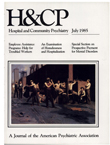The Impact of Medicaid Benefit Design on Length of Hospital Stay and Patient Transfers
Abstract
The authors examined how the Medicaid hospital benefit structure affects the length of stay of psychiatric inpatients and transfers to state mental hospitals and nursing homes. They hypothesized that length-of-stay and discharge patterns would depend on five classes of variables: patient characteristics, diagnosis, mental health status, hospital characteristics, and benefit structure. Analysis of 976 Medicaid cases showed that the variables together accounted for only 17 percent of the variation in patient length of stay; benefit structure alone accounted for 6 percent of the variation, slightly less than the diagnostic variables. A patient's clinical status was the most important predictor of transfer to state mental hospitals, although benefit structure had a significant effect. It had no effect on patient transfers to nursing homes. The authors discuss the implications of the findings for designing prospective payment systems for psychiatric patients under Medicare.
Access content
To read the fulltext, please use one of the options below to sign in or purchase access.- Personal login
- Institutional Login
- Sign in via OpenAthens
- Register for access
-
Please login/register if you wish to pair your device and check access availability.
Not a subscriber?
PsychiatryOnline subscription options offer access to the DSM-5 library, books, journals, CME, and patient resources. This all-in-one virtual library provides psychiatrists and mental health professionals with key resources for diagnosis, treatment, research, and professional development.
Need more help? PsychiatryOnline Customer Service may be reached by emailing [email protected] or by calling 800-368-5777 (in the U.S.) or 703-907-7322 (outside the U.S.).



